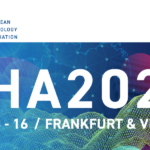
Director of the Lymphoma Department at Tianjin Medical University Cancer Institute & Hospital.

Lymphoma Department at Tianjin Medical University Cancer Institute & Hospital.
The 28th European Hematology Conference/Annual Meeting (28th EHA Congress) was successfully held in Frankfurt, Germany from June 8-11, 2023. The conference was organized by the European Hematology Association (EHA). As one of the largest international conferences in the field of hematology worldwide, the EHA annual meeting gathered top hematology experts from around the globe, covering all aspects of hematology research. The conference featured oral presentations, poster presentations, and several other sessions. This edition of Oncology Frontier focuses on key clinical studies on Hodgkin lymphoma presented in the oral report session, providing a quick overview of the latest research advancements in this area.
CD47/PD-L1 Dual-Specific Antibody (IBI322) for Treatment of Classical Hodgkin Lymphoma (cHL) Resistant to PD-1 or PD-L1: Phase I Study Results
Abstract Number: S216
Presenter: Jingwei Yu | Tianjin Medical University Cancer Hospital
The disclosed data is based on an expanded cohort from a phase I clinical trial (registration number: NCT04795128), mainly assessing the safety and preliminary antitumor activity of IBI322 in patients with classical Hodgkin lymphoma resistant to anti-PD-(L)1 monoclonal therapy. Eligible patients received IBI322 (45mg/kg IV Q2W) until unacceptable toxicity, disease progression, or up to a maximum of 24 months. Currently, 24 subjects have been included, with 23 evaluable for efficacy.
The results show that, out of the 23 patients, the Objective Response Rate (ORR) and Disease Control Rate (DCR) were 47.8% (95% CI: 26.8-69.4) and 91.3% (95%CI: 72.0-98.9) respectively. In 7 primary resistant patients, ORR was as high as 57.1% (95%CI: 18.4-90.1), with 3 patients achieving Complete Remission (CR).
Regarding safety, the rate of Treatment-Related Adverse Events (TRAE) was 91.7%, with the most common TRAEs being lymphocyte count reduction (62.5%), anemia (62.5%), white blood cell count reduction (20.8%), and platelet count reduction (20.8%). Grade ≥3 TRAEs occurred in 41.7% of the patients, with the most common ≥3 TRAE (≥5%) being lymphocyte count reduction (29.2%). No TRAE led to permanent drug discontinuation or death. As of the data cutoff, 12 patients are still undergoing IBI322 monotherapy.
These results suggest that IBI322 monotherapy exhibits promising antitumor activity and controllable safety in patients with classical Hodgkin lymphoma resistant to anti-PD-1 or PD-L1 therapy.
Post-Transplant Nivolumab Monotherapy Combined with Unselected Autologous Lymphocytes for Treatment of Refractory Hodgkin Lymphoma Achieves High Remission Rates and Excellent Survival Rates, Associated with NK Cell Expansion
Abstract Number: S217
Presenter: Dr. Fabio Guolo | University of Genoa, Clinic of Hematology, Department of Internal Medicine (DiMI), Genova, Italy
To enhance the efficacy of immune checkpoint inhibitors (CI) for the treatment of refractory Hodgkin lymphoma (RHL), this study adopted a treatment regimen involving early post-autologous stem cell transplantation (ASCT) with CI (nivolumab) followed by reinfusion of unselected autologous lymphocytes (ALI). The efficacy of this regimen was evaluated based on Complete Remission (CR) and Overall Survival (OS). The biological endpoint was to study lymphocyte subgroups involved in the response mechanism.
The study included 21 RHL patients, based on their response to second and third-line treatments, divided into treatment (n=13, patients with second and third-line treatment failures) and control (n=8, patients with response to second-line chemotherapy or third-line Brentuximab Vedotin (BV)). Patients in the treatment group received early post-transplant CI and 4 ALI supports, while control group patients underwent sequential ASCT followed by standalone ALI.
Results showed that all patients in the treatment group remained disease-free at a median follow-up of 32 months (95% CI: 26.4-51.0); four patients in the control group relapsed (50%). The treatment group did not reach the median Disease-Free Survival (DFS), while the control group’s median DFS was 22 months. Phenotypic analysis of circulating cells showed that, compared to the control group, highly differentiated NK cells expanded faster in ALI+CI treated patients.
The study results indicate that the antitumor activity of ALI+CI treatment for RHL is very high. Compared to the control group (including patients responding to standard treatments), the outcome for treatment group RHL patients was excellent. Biological data suggests this approach might accelerate NK cell development/maturation and promote the expansion of the “adaptive” NK cell compartment.
Pembrolizumab Monotherapy for Pediatric and Young cHL Patients Resistant to First-Line Chemotherapy: Phase II, Open-Label, KEYNOTE-667 Study
Abstract Number: S215
Presenter: IRCCS Ospedale Pediatrico Bambino Gesu, Rome, Italy
The disclosed data is from the interim analysis of the KEYNOTE-667 study (registration number: NCT03407144). The study aimed to assess the efficacy and safety of pembrolizumab combined with chemotherapy for cHL patients with Slow Early Response (SER). A total of 49 high-risk cHL patients with SER were enrolled and received pembrolizumab consolidation therapy plus 4 cycles of cyclophosphamide, vincristine, prednisone/prednisolone


